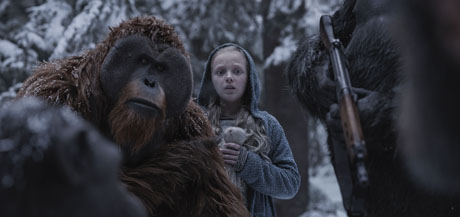Movie Review: War for the Planet of the Apes
By Matthew Huntley
July 27, 2017
BoxOfficeProphets.com

Narratively, it's not as strong. Whereas the design of “War” is remarkable and really allows the movie to stand out, the storytelling gets undermined by over-the-top characterizations and traditional war movie plot developments, which are mostly just adequate. In fact, were it not for the visual elements, we might have left the theater feeling a bit empty. How could a movie be so exemplary in one aspect and yet so average in another? It's hard to say, but had as much attention been paid to the screenplay as the production values, we might have been watching the best movie of the year.
In what promises to be the final chapter of this Planet of the Apes prequel trilogy, which seeks to explain how the planet of the apes came to be, the war between apes and humans “wages on.” You'll recall the first movie in the series, Rise of the Planet of the Apes, introduced us to Caesar (a motion captured Andy Serkis), the chimpanzee leader who gained hyper-intelligence, including the ability to speak, and led a rebellion against his human oppressors. Its follow-up, Dawn of the Planet of the Apes, continued to show Caesar and his followers struggling to survive just as humans began dying out amidst a fatal, worldwide epidemic, to which apes are immune. “War” sets out to deliver mankind's final blow, which we suspect will leave only a fraction of the race alive so they can ultimately become subservient to apes.
As a story, the movie is not much more than its title indicates. This is a war movie all right, with clearly defined good guys and bad guys, and even though the screenplay by Mark Bomback and director Matt Reeves gives the primary characters some dimension and a chance to explain their motivations, it seems more interested in its conventional Great Escape-type plot, complete with an action-filled climax that's heavy on effects and several “just in the nick of time” moments, like when certain traitorous apes suddenly redeem themselves for the greater good. This will no doubt please anyone wanting to see a summer blockbuster, but because the series had matured and progressed from the first film to the second, I was hoping this third entry would be even more substantive instead of being so hellbent on tying up loose threads and going out with a bang - literally.
The plot picks up five years after the events of “Dawn” as a rogue faction of the U.S. military, called Alpha-Omega, hunts for Caesar and his followers. Alpha-Omega is led by the merciless “Colonel” (Woody Harrelson), who explains later on why he's so adamant about bringing Caesar and the other apes down, although, even as a villain, the Colonel's behavior and characteristics seem extreme and heavy handed. Do we really need a shot of him overlooking his soldiers as he shaves his head shirtless? Were the filmmakers trying to make him akin to a modern-day white nationalist? It's a bit much.
Amidst the continued violence and devastation between the two species, Caesar plans on leading the apes, including his wife and two children, to the desert for sanctuary. He thinks sparing the Colonel's men after a recent attack by Alpha-Omega would show he's willing to be merciful and make peace. But a subsequent tragedy pushes Caesar over the edge and his heart turns vengeful. He vows to kill the Colonel at “the border,” a compound that Alpha-Omega is fortifying in anticipation of an all-out assault by the primary U.S. military.
Along the way to the border, Caesar, Maurice (Karin Konoval), Luca (Michael Adamthwaite) and Rocket (Terry Notary) discover the effects the mutating Simian Flu Virus is having on humans, causing them to regress to primitive form and even lose their ability to speak. They gun down one Alpha-Omega soldier who has already started to turn but find he has a mute daughter (Amiah Miller), whom they decide to rescue. “We're not savages,” Caesar declares.
But savagery, along with anger and sadness, have corrupted the Colonel, whose army has captured and enslaved the rest of the ape population, not allowing them food or water and forcing them to build a wall. The Colonel's treatment of the apes is obviously meant to parallel the treatment of blacks during American slavery, or Jews during the Holocaust, and even though it garners a reaction from us, the Colonel's disregard for simian life is so severe it borders on unbelievable. I suppose his eventual back story helps, but I saw the Colonel character as a means to simply make Caesar appear more upstanding and sympathetic by comparison, and ultimately as a way to get us to root for the apes more, which made the movie feel manipulative and artificial. It also takes too long to do what we suspect it will do once the plot and characters are in place, but it doesn't bring enough fresh developments to the table in order to justify its near two and a half hour runtime.
And yet, despite all its narrative shortcomings, I still recommend “War” for its visual design. If the movie is to be seen, it should be seen in the theater because the imagery and effects are so astonishing. It's just a shame they don't service a better story, one that actually explores its ideas rather than merely making them excuses for violence and action. It's funny, but just as humans are starting to devolve on the planet of the apes, I feel like this series is also starting to revert to something less. Hopefully it will keep its promise and be the last “Apes” movie for a while. At least then it will have quit while it's still ahead.